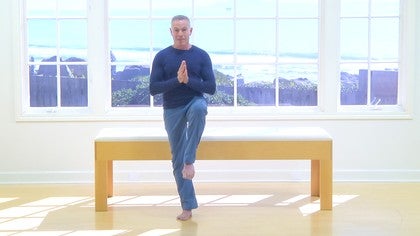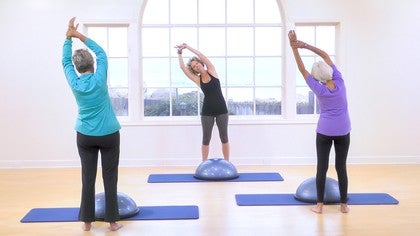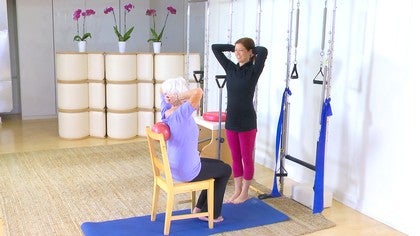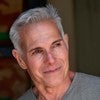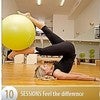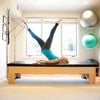Description
About This Video
Transcript
Read Full Transcript
Hello, my name is Kevin Bowen and today I'd like to talk to you about balance. Uh, I became very interested in balance when I was asked to teach a workshop in balance and since balance is one of the principles of [inaudible], I wanted to do a little research and exploration about it. Um, so I found out some interesting facts that I don't think everybody knows or maybe they do, but they just don't quite realize. Older adults, one in three usually end up falling from lack of balance, the leading cause of both fatal and nonfatal injuries. For an older adult, and I'm talking someone who's 60, 65 and older is a fall, 20 to 30% of the falls suffered, usually have some form of moderate to severe injury that occurs from falling, from lack of balance in an older adult. Most fractures that occur are caused by falls.
So I thought to myself, hmm, balance. I know I'm balanced. I have to be balanced. I teach [inaudible]. I do pull out these on a regular basis. So I stood up by myself one day and tested my balance. And what I found out was, is I was hardly balanced at all.
Just by the simple fact of standing up. There were some great things that we can do to test our balance. Um, simple, easy balance tests that anybody can do in the privacy of your own home, standing up on two feet and holding it. Depending upon your age for account of 10 20 or 30 seconds, you can stand on two feet without losing your balance for 10 seconds. When you're over 65 or 70, that's good, but in my opinion, that's not good enough.
If you can stand on one foot for a period of 10 seconds when you're over 65 that's deemed to be excellent, but I still don't think that's good enough either. A, if you could stand with one foot in front of the other one for a period of 10 20 or 30 seconds, depending on your age, without swaying and rocking and throwing your body off, that two is supposed to be good. What I discovered was having had about five injuries on the right side of my body from a broken second metatarsal on my right foot to a torn vest, this ladder Allis to two torn hamstring muscles on the right. And a couple of other things. I realized how off my balance was. I also realized what was happening to me inside my head was I was resigning myself to the fact that I'm 55 years old.
These things happen with age. This is what goes on. And I was resigning myself to limit my range of motion and limit my mobility. And I didn't mean to do it, but it happened. And then I caught myself and I thought, this is simply not acceptable. I'm not going to allow this type of thing to happen to me.
And I really didn't want to allow it to happen to anyone that I've worked with or my clients or anyone else. So I'm on a balance kick now. And I think that balance is extraordinarily important. Uh, it overlaps so many parts of our life that we don't realize just the ability to get down and up off the floor very simply. Even in a way like this is something that's very important. A lot of people don't have that mobility. They fall, they get down, they can't get back up and it's a problem. I discovered that when I stood on one leg on my right leg on my weak side, I really had a very difficult time doing it.
I even further discovered that if I tried to raise up c on my right foot, that my right foot was so weak from the foot injuries that I've had, not only that broken metatarsal, but a very severe sprain many years ago when I was young. So I started working on my balance and my ability to stand up tall and erect and my ability to actually move well and be able to bend over and stand up. So I urge you and your friends and everyone else to focus on your balance. There's an aspect about balance that also is very important because it kind of overlaps and overlays Palase and that really has to do with not only our physical balance but our mental balance and our wellbeing. And this is a big issue. Keeping a clear head, realizing where we have to be balanced between what we do for work, what we do at home, what we do in play is all very important.
Once all of those things get out of balance, we start to lose our own internal balance that is going to further allow us to be balanced as we move. Uh, I just recently heard a Harvard neuroscience professor talking about how the brain works and how things happen in the body, which was a fascinating conversation with brain body communication. But, uh, he was asked by Terry Gross, this was on NPR. If there's one thing that you could do as a person to assist your brain and functioning and assist you with longevity for the rest of your life, what would it be? Would it be these new, you know, brain games that are out? Would it be some neuroscience? Would it be Lumosity? Everyone's heard of these things and his answer was the, the one thing you can do is keeping your body fit and staying active.
Exercise is the most important thing you can do to keep your brain functioning and your body healthy. So remember that. Thank you.
The Teacher's Corner: Improving Balance
Comments
You need to be a subscriber to post a comment.
Please Log In or Create an Account to start your free trial.
